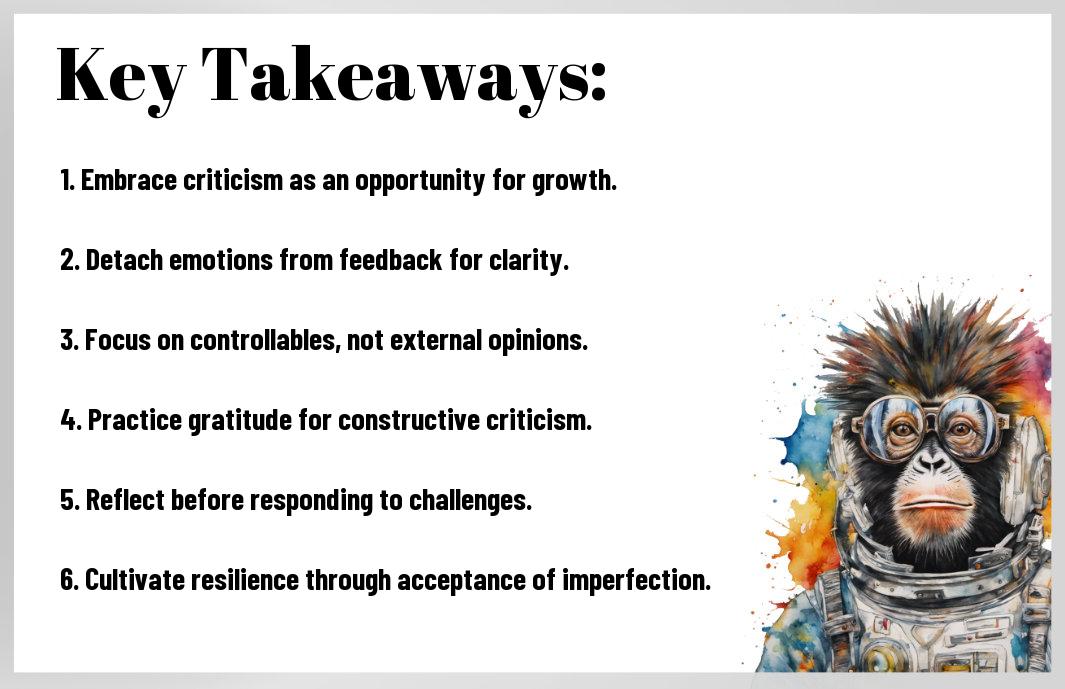
Newsletter Subscribe
Enter your email address below and subscribe to our newsletter

Enter your email address below and subscribe to our newsletter

There’s something quite enlightening about the way Stoics handle criticism. As I navigate life’s challenges, I’ve found that employing Stoic principles can transform the way I respond to feedback, both positive and negative. It’s easy to feel defensive or upset when faced with criticism, but by embracing a Stoic mindset, I can cultivate resilience and maintain my peace of mind. In this post, I’ll share some practical strategies that have helped me deal with criticism more effectively, allowing you to approach feedback with a sense of calm and strength.

Your journey to dealing with criticism effectively starts with truly understanding what criticism is all about. It’s necessary to recognize that criticism is not merely a negative evaluation; it’s a response to our actions, ideas, or creations. Many times, it reflects the viewpoint of another person. While this might feel overwhelming, I find it helpful to view criticism as a piece of feedback rather than a personal attack. When I can separate my identity from my work, I create space for growth and improvement based on the feedback I receive.
Criticism can manifest in various forms, from constructive and supportive to harsh and unkind. It can prompt reflection and lead to positive changes, especially when delivered with the intention to help. On the other hand, it can also feel demoralizing, particularly when it’s unsolicited or comes without context. As I navigate through experiences of critique, I strive to dissect the intent behind the words. Is the critic offering a desire to improve things? If I can focus on constructive criticism, I can channel it into a powerful tool for my personal and professional development.
Criticism tends to instill fear in many of us because it can feel like a threat to our self-worth and confidence. When someone critiques my work, I often worry it reflects more about who I am rather than the quality of what I’ve created. The deep-rooted fear of rejection or judgment can make any critique feel enormous, overshadowing the potentially valuable insights that might accompany it.
Another aspect of this fear arises from our natural inclination to seek validation. We often tie our self-esteem to the approval of others, and criticism can shatter that delicate construct we’ve built around our self-image. This can lead to avoidance—avoiding feedback, discussions, or even putting my work out into the world altogether. Understanding this fear allows me to confront it, embrace it, and ultimately grow beyond it. After all, every criticism carries the potential for learning and personal evolution, if only I’m willing to engage with it positively.
Assuming that criticism is an inevitable part of life, I find that the Stoic approach provides a powerful framework for dealing with it effectively. The ancient Stoics, like Epictetus and Marcus Aurelius, taught that our responses to external events are within our control, while the events themselves are often not. Embracing this perspective helps me focus on what I can change—my thoughts, reactions, and feelings—rather than becoming stuck in anxiety or anger over what others think of me. By adopting this mindset, I create a space for growth and resilience that allows me to flourish, even in the face of negative feedback.
The acceptance of criticism does not mean I need to agree with every single point made. Instead, it’s about recognizing that feedback, whether positive or negative, presents an opportunity for reflection and improvement. This acceptance can be liberating; it frees me from the burden of needing everyone’s approval and allows me to focus on my personal journey and development. I can learn to see these criticisms as mere opinions rather than definitive truths about my worth or capabilities.
After I remind myself of the impermanence of external opinions, I realize how powerful perspective can be in my response to criticism. Instead of viewing criticism as a personal attack, I can choose to see it as a chance to learn and grow. This shift in perspective turns the feedback into a constructive tool rather than a weapon against my self-esteem. I can ask myself questions like, “What truth, if any, can I find in this criticism?” or “How can this help me improve?” This strategic approach allows me to process feedback more effectively and seek out areas for personal growth.
Also, embracing perspective means that I acknowledge the subjectivity of criticism. Each individual has their own experiences and biases that shape their opinions. By understanding this, I can place my worth in my actions and principles instead of letting someone else’s judgement define me. This becomes a reminder that what one person perceives may not reflect the whole picture. In seeing criticism this way, it empowers me to not take things too personally, thereby paving the way for a healthier interaction with feedback in the future.

To effectively navigate criticism, you’ll want a solid strategy in place. Handling critiques can often feel overwhelming, but with the right approach, you can transform it into a learning opportunity. One method I’ve found particularly useful is to reflect before responding. When faced with criticism, pausing for a moment allows me to sort through my initial emotional reaction. It’s easy to feel defensive, but taking that step back helps me engage with the feedback more thoughtfully, rather than reacting in the heat of the moment. This reflection time can make a significant difference in how the conversation unfolds.
Around this time, I try to ask myself a few guiding questions. For instance, is there any truth to what’s being said? Are there multiple perspectives I should consider? By analyzing these elements, I can respond more effectively and ensure that my answer contributes to a constructive dialogue rather than escalating tensions. This reflective practice ultimately allows me to navigate criticism with grace and enables a healthier exchange of ideas.
Practical strategies don’t stop at self-reflection; they extend to actively seeking constructive feedback as well. When I anticipate that I might encounter criticism, I make an effort to reach out to trusted peers or mentors for their insights beforehand. By inviting their input on my work or behavior, I can gain a clearer understanding of potential areas for improvement. This proactive approach not only helps me mitigate harsh critiques in the future but also fosters a culture of open dialogue and continuous learning.
In fact, seeking constructive feedback can often lead to deeper connections with others, as it demonstrates your willingness to grow and improve. By engaging with people who provide thoughtful and honest perspectives, I can better navigate challenges and diminish the sting of unexpected criticism. Plus, this approach empowers me to take charge of my own development, making criticism feel less daunting and more like a collaborative effort towards improvement.

Unlike the conventional approach of bending under the weight of criticism, cultivating resilience enables you to stand tall against it. When faced with negativity, resilience serves as your emotional buffer. It empowers you to absorb critical feedback while keeping your self-worth intact. I find that developing resilience helps me experience criticism as a learning opportunity rather than a personal attack, allowing me to grow from the experience instead of being derailed by it.
Across my journey, I’ve realized that strengthening my inner self is an vital part of building resilience. This process involves nurturing my self-esteem and reaffirming my values. I make it a point to engage in activities that promote self-awareness and self-acceptance, like journaling and positive affirmations. By doing so, I create a solid foundation that allows me to face any criticism with confidence. The more I invest in my inner self, the less likely external voices can shake my belief in myself.
By practicing mindfulness, I cultivate a deeper awareness of my thoughts and feelings, which helps in dealing with criticism more effectively. Engaging in mindfulness techniques like meditation allows me to observe my reactions without judgment. When criticism strikes, I try to pause and check in with myself, assessing whether the feedback aligns with my understanding of who I am and what I stand for. This pause gives me space to choose my responses rather than reacting impulsively.
But the effectiveness of mindfulness goes beyond just understanding our reactions. It allows me to approach criticism with a gentler perspective, acknowledging that the opinions of others are often shaped by their personal experiences and insecurities. This awareness helps me detach my self-worth from their feedback, making it easier to view criticism objectively. As I develop this practice, I find that my resilience strengthens, equipping me to handle future challenges with grace and aplomb.
Not every interaction is the same, and I find that being prepared can make a significant difference when dealing with criticism. Here are a few tips that I use to handle everyday encounters more effectively:
After you’ve processed the feedback, find a way to incorporate it into your growth without letting it define you.
About engaging with criticism positively, I like to think of it as an opportunity rather than a setback. When I receive criticism, I try to take a step back and assess the validity of the feedback. Instead of getting defensive, I ask myself whether there is something valuable I can learn from it. This often involves actively listening, and I make an effort to truly hear what the other person is saying before formulating a response. By turning criticism into a learning experience, I can genuinely improve while maintaining a sense of agency over my own growth.
Across my experiences, maintaining a healthy mindset is key when dealing with criticism. It’s important to remind myself that feedback isn’t a reflection of my worth as a person. Instead of viewing criticism as a personal attack, I try to see it as constructive feedback aimed at my actions, not my identity. By framing criticism in this way, I can focus on the potential for growth rather than getting bogged down in negative emotions. This shift in perspective often leads to a more productive dialogue with the critic, making it easier for me to engage positively.
Indeed, a healthy mindset also involves self-compassion. I must treat myself with kindness when I stumble, understanding that everyone receives criticism. By fostering this kind attitude, I not only enhance my resilience but also create an environment where I feel comfortable facing feedback head-on. So the next time I encounter criticism, I choose to approach it with curiosity and an open heart, ensuring my journey toward self-improvement continues to flourish.
Conclusively, embracing criticism as a Stoic is not just about developing a thicker skin; it’s about cultivating an understanding that criticism can be a tool for growth. When I approach feedback, I try to view it through a lens of curiosity rather than defensiveness. This perspective allows me to assess what’s being said and how it aligns with my values and actions. By acknowledging and reflecting on the critiques in a calm manner, I empower myself to make informed changes if necessary, or confidently maintain my course if the feedback doesn’t resonate with my principles.
Additionally, it’s important to remind myself that not all criticism deserves my energy or attention. As I reflect on how Stoics deal with criticism and haters, I find it helpful to focus on what I can control—my reactions and my thoughts. If you’re curious about more insights on this topic, you might want to check out How do Stoics deal with criticism and haters? Ultimately, by adopting this mindset, I feel more resilient and better equipped to handle whatever comes my way. With practice, I believe anyone can learn to navigate criticism with grace and wisdom, turning potential conflicts into opportunities for personal development.
A: Dealing with criticism like a Stoic involves adopting a mindset that prioritizes rationality and emotional resilience. Stoicism teaches individuals to focus on what they can control—their reactions and thoughts—rather than the external circumstances or the opinions of others. This approach allows one to evaluate criticism objectively and respond in a constructive manner.
A: Constructive criticism is aimed at helping you grow and improve, often providing specific feedback and actionable advice. It is usually delivered with kindness and respect. Destructive criticism, on the other hand, tends to be vague, harsh, and focused on personal attack rather than growth. Cultivating a level of detachment can help you discern the intent behind the feedback you receive.
A: To maintain calmness when faced with criticism, try the following strategies: take deep breaths to center yourself, pause before responding to think through your answer, and remind yourself that everyone has their own opinions. Practicing mindfulness can also help in keeping your emotions in check, allowing you to approach the situation more rationally.
A: Viewing criticism as an opportunity for growth can be transformative. Analyze the points raised in the critique, filter out subjective elements, and focus on actionable insights. By seeking to understand the underlying message, you can leverage feedback to enhance your skills and performance. Reflection and willingness to adapt are key components of this process.
A: If accepting criticism proves challenging, consider practicing self-compassion. Acknowledge that everyone makes mistakes and has areas for improvement. You might also want to seek external perspectives or discuss your feelings with trusted friends. Gradually, exposure to constructive criticism can help desensitize the emotional response, making it easier to accept in the future.
A: Absolutely! Applying Stoic principles can enhance your relationships by fostering open communication and empathy. By responding to criticism thoughtfully, rather than defensively, you create a space for constructive dialogue. This approach can pave the way for mutual respect and understanding, turning potentially negative experiences into opportunities for collaboration and connection.
A: To incorporate Stoic techniques into your daily interactions, start by reflecting on the Stoic values of wisdom, courage, justice, and temperance. Practice self-awareness by identifying your emotional triggers when confronted with criticism. Use phrases that resonate with Stoic thought, such as “This too shall pass,” or “What can I learn from this?” Consistent practice will strengthen your ability to respond with composure and clarity.